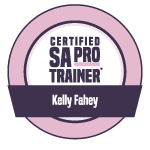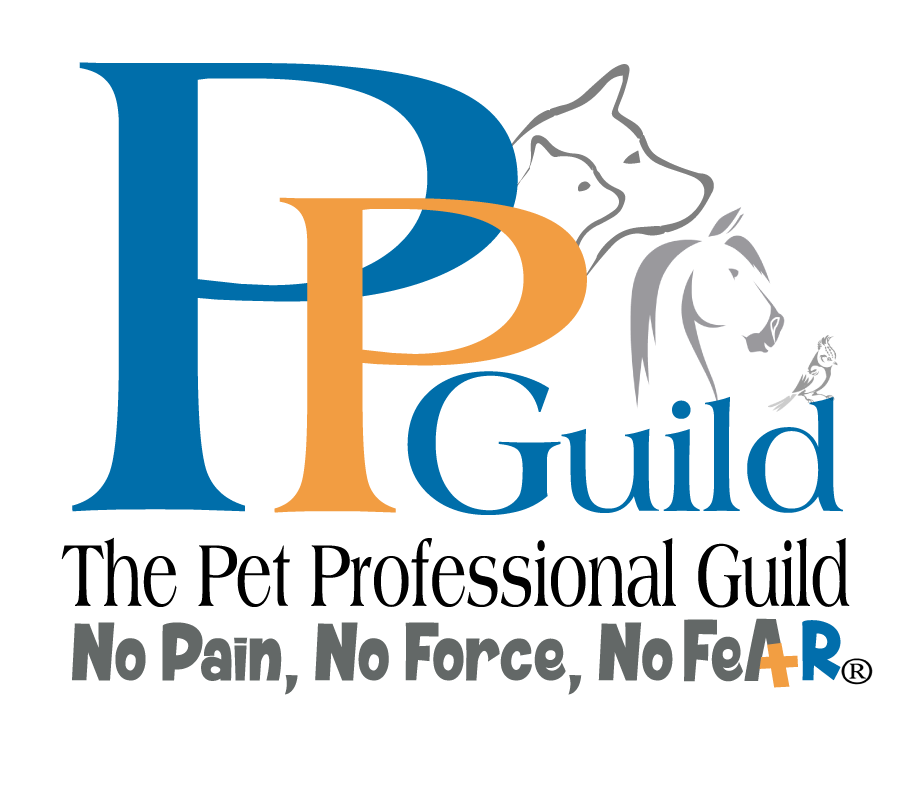Welcome to the world of puppy parenting, where joy and chaos coexist! Who knew one, little puppy could bring out so many emotions… love & frustration, excitement & overwhelm, and fun & exhaustion. But fear not! I’m here to unveil the most crucial aspect of your puppy training plan: management. Yes, you read that right. This essential skill is not for your puppy, but for you, the puppy parent. So, buckle up and get ready to discover how management holds the key to your successful puppy raising journey.
While bringing a new puppy into your life is exciting (I’m like a kid at Christmas when a new puppy is coming into our home), it also comes with a few challenges (ok, let’s get real… A LOT of challenges). From house training headaches to being baffled by the puppy biting and the crazy chewing, raising a puppy can sometimes feel like a whirlwind (or hurricane, and some days even feel like a tornado).
Typical “Bad” Puppy Behavior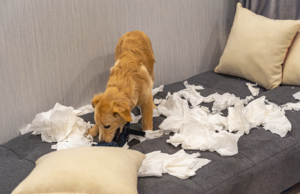
Puppy parents come to me with a laundry list of behaviors they want to “stop” or “correct”. During our initial meeting puppy parents are desperate for help with puppy predicaments such as:
- How do I train my puppy to outside to potty or what is the easiest way to housebreak a puppy?
- Why is my puppy biting so much or how do I stop my puppy from biting?
- How can I stop my puppy from chewing
- How do I get my puppy to stop jumping on people?
These are just a few of the questions that come fast and furious and that people are desperate to get answers for.
Here’s the challenge. There is no way we can address all of the overwhelming puppy training problems and solve them in one session.
Puppy Training 101:
There is a learning process for your puppy AND there is a learning process for you as the puppy parent. As someone who has shared their homes with a lot of puppies, I totally get it and I can sympathize with the overwhelm and frustration, and needing some sort of relief from it all.
Raising a puppy is a marathon, not a sprint. Raising a puppy is a journey and we have to navigate the path according to our puppy’s developmental stages and take our own bandwidth into consideration. Puppy raising is hard, ya’ll. There bumps (and literally bruises) along the way. Some paths feel tougher to navigate. If we prepare for our journey, properly, we will be able to enjoy the paths to our destination, better.
How to Train Your Puppy:
In the early days of puppy training, management makes up a significant portion of your puppy training strategy. Yes, this is considered training.
Some might view it as a copout or a lazy approach, but let’s set the record straight. Management is not a shortcut; it’s a smart, proactive, and necessary way to guide your puppy towards desired behaviors. Think of it as the foundation upon which all of your puppy training is built.
How Do I Stop Bad Puppy Behavior?:
Let’s dive into some practical examples of management techniques and understand why they are crucial in puppy raising. During the house training phase, closing doors to certain rooms and using gates helps limit the amount of freedom your puppy has. This helps in minimizing house training accidents.
Providing plenty of proper puppy chews redirects their biting and chewing instincts away from your favorite shoes, furniture, or even your arm, saving your sanity while promoting healthy habits.
Using a crate or exercise pen when you can’t keep a watchful eye on your puppy prevents destructive behavior.
Have your puppy a leash or behind gate to prevent jumping up helps to teach polite greetings.
Using an extra long leash (not a flexi leash) while out on walks or in your backyard will keep your puppy from running off and aid in your puppy learning to stay near you.
Each of these management techniques is an essential tool in guiding your puppy’s behavior.
The examples I listed above are just a few ways we can help our puppies make good choices during the day (and keep us sane). If you have a puppy predicament, there is a management strategy that can be put in place as part of your puppy training plan.
The Secret to Puppy Training:
It’s natural for puppy parents to sometimes feel discouraged when relying heavily on management. However, it may seem like we aren’t actively addressing the problems we encounter. But let me reveal the truth—management is our secret ingredient.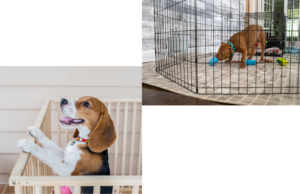
You have a superpower: preventing unwanted behaviors. By putting management techniques in place, you are subtly guiding your puppy to make better decisions and learn how to thrive in your world.
Moreover, management is part of a series of training strategies I call “Training Without Trying.” To make life easier, all my puppy parents implement certain measures for passive training. Life is hard enough as it is, and adding a new puppy to the mix makes it even more complicated and tiring.
Furthermore, management allows you to prevent your puppy from rehearsing unwanted behaviors. Here’s the thing: the more your puppy practices a behavior, the better they will get at it. This applies to unwanted behaviors too, not just the ones you want them to learn. By implementing management strategies, you’re doing both you and your puppy a huge favor and being a proactive puppy parent.
Additionally, by putting this passive training system in place, you are no longer being reactive to your puppy’s behavior. It also leaves more time for purposeful training interactions with your puppy.
Management Isn’t a Cop Out
So, let’s not think of management as lazy or useless when it comes to training our puppies. Instead, let’s consider it the superpower that will make your life easier while your puppy learns all those valuable skills you desire.
Setting Puppies Up for Success: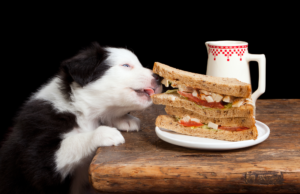
Remember, our puppies don’t come into this world knowing what we want from them. However, through management, we can bridge the communication gap and guide them to become well-behaved companions. Management acts as the compass that steers them in the right direction, helping them grow into confident and happy dogs. What’s more, it will keep you from being frustrated and overwhelmed by your puppy day in and day out.
As you embark on your puppy parenting journey, keep in mind that management is not a sign of weakness but a testament to your dedication as a responsible puppy parent. So, embrace the power of management! By doing so, you’ll witness the remarkable transformation of your puppy. Let’s start incorporating this essential skill into our puppy training plan and unlock the true potential of our furry, four-legged family members. Together, we can raise well-mannered pups and create a harmonious bond that lasts a lifetime.




